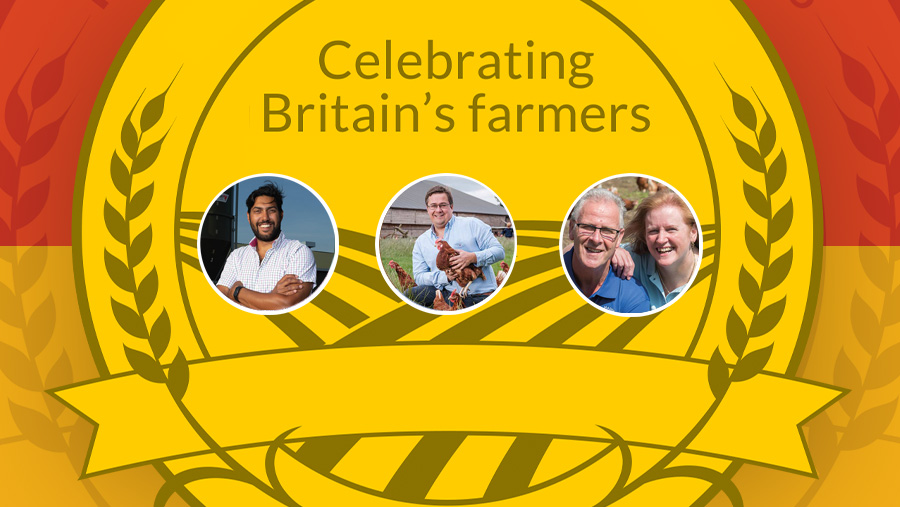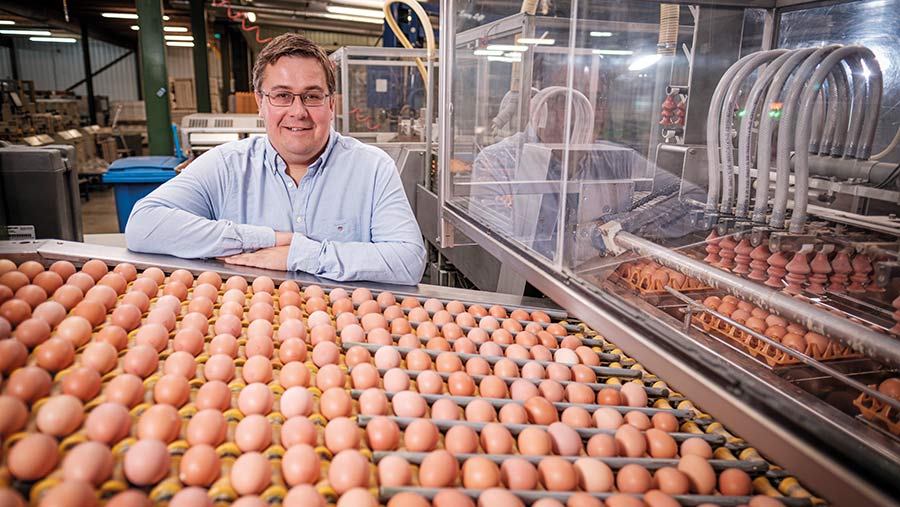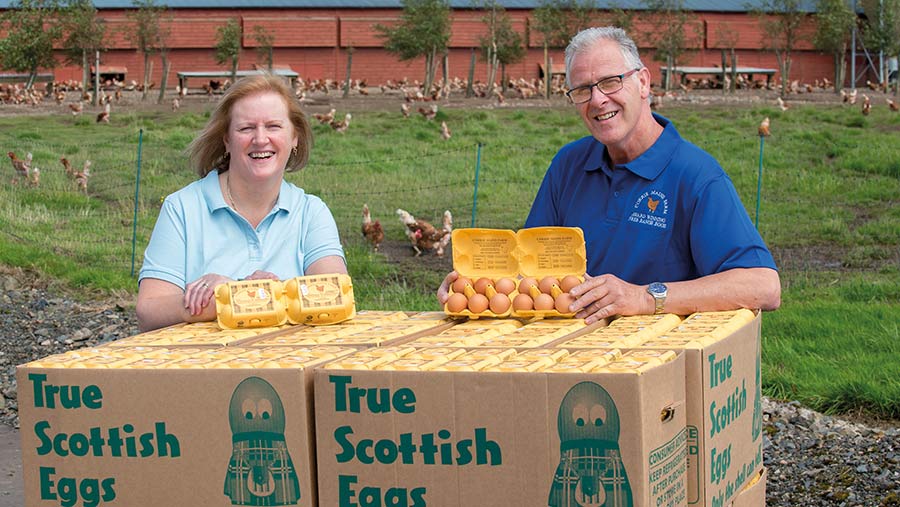Farmers Weekly Awards: Poultry Farmer of the Year finalists 2020

Although each farm business operates distinctly differently in this year’s Farmers Weekly Poultry Farmer of the Year category, the finalists were united by a passion for keeping free-range hens.
We report on three diverse and successful farming enterprises.
See also: Farmers Weekly Awards: Poultry farmer finalists 2019
The 2020 Poultry Farmer of the Year finalists:
- Phillip Ashton
David Ashton, Boston, Lincolnshire - Tom Elliott
Elliott Eggs, Driffield, East Yorkshire - Jim and Anne Smillie
Corrie Mains Free Range, Mauchline, East Ayrshire
The judges
- Susie Mac
Last year’s winner - Jake Davies
Editor of Poultry.Network - Aimee Mahoney
NFU chief poultry adviser
Phillip Ashton
David Ashton, Boston, Lincolnshire

Phillip Ashton © Tim Scrivener
Phillip Ashton’s story is one familiar to many farming businesses across the country. The next generation wants to come back to the farm, but the existing enterprise cannot support another family.
The poultry sector, with its promise of steady returns on a relatively small parcel of land, has helped many holdings overcome this challenge.
After leaving school, Phillip embarked on what was supposed to be a gap year with a stint as a chalet host. Upon his return, university loomed but, as he puts it, “my head and my heart were still in the mountains”.
Three more successful seasons on the snow followed, and Phillip’s skiing improved to the extent that there was the prospect of a professional career.
But a bad crash put paid to those ambitions and, in the face of adversity, he returned home to put down roots.
The farm
A part-time Agriculture and the Environment course at Lincolnshire University followed, and it was the final project that got Phillip thinking about ways to improve the farm business. “An area of the farm that was making zero money was the old cattle paddock and shed.”
He planned a small-scale egg business, marketing the eggs himself from hens ranging a 2.5ha site. But what was initially to be an operation from 2.5ha of grass evolved into a multi-tier 16,000-bird free-range site.
Phillip signed up with Noble Foods, producing eggs to the Happy Egg Co standard. “I looked at it as a way of reducing the farm’s fixed costs. It spread the risk and optimised our assets,” he explains.
That first flock was a “baptism of fire”, he says. New sheds often have a period where no health issues emerge in the birds, but he was unlucky.
Disease hit, and managing the farm became extremely tricky. “I worked seven days a week for 27 weeks,” he explains, determined to make a success of the new venture. “I gave my life to it.”
The focus
That determination ultimately paid off for Phillip. After a bumpy first flock, results rapidly improved, with egg numbers consistently north of 330 eggs/bird at 72 weeks. A second shed – this time, a 32,000-bird unit – followed seven years later.
When walking the birds, it’s easy to see why the diversification has been a success. The farm is meticulously maintained. Biosecurity is no afterthought here – it is built into every element of the operation.
Phillip is constantly experimenting with ventilation, enrichments and supplements to improve the performance of his laying hens further.
As the business has evolved, he has recruited staff to help with the management of the birds and has a relationship with them that he clearly values.
Away from the hens, he has developed the arable side of the farm by entering into a joint venture and used solar energy to improve sustainability and reduce costs.
The influence
Visitors to the NFU’s head office may recognise Phillip – he is one of the union’s faces of farming across its advertising and media. Besides that, though, he is an active member of the local branch and has worked, in particular, alongside the police to tackle rural crime.
He is also part of a local discussion group and sponsors the village football team. Phillip helped Noble Foods out by appearing in a TV ad for them – readers may remember him as the farmer who took 800 hours to build an automatic egg poaching machine.
Beyond that, however, he says he is active in the packer’s Happy Egg Guild and tries to positively influence decisions made at the firm about how it works with farmers.
What the judges say
Phillip is the third and final-generation custodian of the tenanted holding that his grandfather set up just after the Second World War. He came into the business in the mid-1990s and set out to develop a free-range egg diversification to help support the farm’s profitability and hasn’t looked back, achieving some fantastic results and expanding bird numbers.
Summary
The judges liked
• Clear plan to make family farm business viable
• Hard work in the face of significant challenges
• Consistently excellent performance from hens
Farm facts
• 300ha holding – some owned, but mostly on an Agricultural Holdings Act tenancy
• Phillip is the third and final generation to manage the farm
• Arable joint venture farming 900ha in total
• 16,000- and 32,000-bird free-range hen units supplying Noble Foods
The numbers
• 16,000-bird free-range unit made a viable business from an unprofitable part of the farm
• 32,000 Total bird numbers following an expansion seven years after the first shed was built
• 339.7 eggs per bird at 72 weeks – his highest-performing flock
• 900ha The total area that the arable joint venture farms
Tom Elliott
Elliott Eggs, Driffield, East Yorkshire

Tom Elliott © Jim Varney
The Elliott family farm has grown from a mixed operation taken on by Tom’s grandparents in 1958 to a thriving and diverse rural enterprise that employs 40 people across three businesses.
A lot of that growth has undoubtedly come from success in poultry farming – both technical know-how and a keen eye for what works commercially.
Tom is the third generation to work the farm, having returned to the business in 2003 after college, travelling and working on other farms. Since then, along with his family, he has steadily grown the operation into a successful egg producer-packer alongside arable and contracting outfits.
The farm
Manor House Farm was one of the first in the country to go into free-range eggs way back in 1989, with a 3,000-bird shed – big at the time. That steadily expanded over the years until 2004, when the fifth shed took bird numbers to 45,000 in total on flat-deck systems.
Up until 2007, eggs had been marketed purely to packers. But returns were poor, so the decision was taken to pack and market the eggs themselves under the Elliott brand.
Another step towards self-sufficiency came in 2008, when the decision was made to mill poultry feed in-house. “It’s been one of the best things we’ve ever done,” Tom says.
The farm still needs to buy soya in to improve protein levels, but he is actively looking for an alternative that could be produced closer to home to help move towards self-sustainability.
“Soya is the only big thing that we’re bringing onto the farm, so we’re trying to find alternatives that we can grow,” he explains. A trial of lucerne was disappointing, but Tom has hopes a home-grown protein may emerge in the coming years.
The focus
Since deciding to pack eggs themselves, finding new markets and building a brand has been a significant focus, as has packing on behalf of contracted producers through EggSell.
So, in addition to the 45,000-birds on the farm, Tom markets the eggs of about another 800,000 birds from 27 other producers.
“Because we have the experience with chickens, we have pretty good sector knowledge,” he explains. New entrants to free-range egg farming are offered support from planning applications through to the first flock of birds.
All eggs are packed at the family farm, before being distributed to a broad customer base by the company’s fleet of lorries – another business to manage in itself, Tom says.
The influence
Tom is proud of the long-term supply relationships he has built, but is also not afraid to walk away from contracts that are not working.
Both Elliotts Eggs and EggSell have a diverse range of customers; from wholesalers after the sharpest price point to high-end retailers that want a product with more focus on provenance and distinction.
An innovation in production designed to appeal to restaurants is eggs with golden yolks, that stand out on plates.
The business also works to manage the profile of eggs sold to maximise returns. One example is an innovative poached egg product that is complicated to produce, but offers an outlet for smaller eggs that are often of lower value.
Beyond the farm, Tom holds positions on boards including the British Egg Industry Council’s marketing committee and the Central Egg Agency, helping to shape policy and improve the market as a whole.
He has grown up in free-range egg production and, with his family, has developed a successful enterprise that is not only profitable, but supports almost 30 other farm businesses.
What the judges say
After coming back to the family farm in 2003, Tom has taken the business from strength to strength, developing a packing centre and moving into home-milled feed. He has also taken on the management of EggSell, which is now grading five million eggs a week.
Summary
The judges liked
• Highly experienced in free-range egg production
• Clear plan to move from producer to producer packer, executed well
• Markets produce to a broad range of businesses
• Innovative product development to sell the broadest profile of eggs possible
Farm facts
• 45,000 free-range layers
• Mills own feed for poultry
• Packs own eggs as well as 30 other farms’
• 200ha arable operation
• 23,000ha of mixed contracting
• 40 staff employed over three businesses
The numbers
• 1989 The year the farm first entered free-range egg production
• 45,000 free-range birds on farm
• 800,000 number of birds that the farm packs the eggs of
• 2010 the family were able to buy the home farm as sitting tenants
Jim and Anne Smillie
Corrie Mains Free Range, Mauchline, East Ayrshire

Anne and Jim Smillie © Angus Findlay
Perched above the Ayrshire town of Mauchline is the Smillie family’s free-range egg farm, which they have spent a lifetime developing. Their story in farming begins with Jim’s parents’ small dairy farm on the outskirts of the new town of East Kilbride.
The family had a milk round supplying residents, but as supermarkets gained a foothold in the area, fewer shoppers were ordering milk to their doorsteps.
Wanting to strike out independently, the pair found a smallholding on the edge of Mauchline in 1996 and decided to move solely into free-range egg production.
They began to develop an egg round, with an honesty box in front of the house, followed by a van supplying smaller shops and restaurants in the local area.
While the supermarkets had driven the decline of Jim’s family dairy business, the rise in farmers’ markets around the turn of the century proved a boon. “We realised at the time 8% of our total production was giving us 40% of our income,” says Anne.
There was a double benefit, adds Jim, in that local shops and restaurants would see the brand at the markets and become customers themselves.
The farm
Farmers’ markets proved one part of the family’s success story, but another was the location of the smallholding – in 2008 they were able to sell it to property developers and move two miles up the road to a larger parcel of land.
Bird numbers grew more rapidly there, and there was room for an enlarged packing centre. The farm expanded to the present-day total of 25,000 birds (some of which are on a different site), split into seven flocks.
They are staunch supporters of small flocks on flat-deck systems, and while the numbers may seem small to some free-range egg farmers, it allows the business to match production with their markets.
“We believe our biggest achievements lie in our steady growth of production in alignment with our customer demand. We never create a surplus and are quick to react to an oversupply.”
The focus
Production is a challenge, as the farm is multi-age, but it is something Jim takes in his stride. Biosecurity and constant attention to detail keep flocks in good order, and that birds are regularly taken beyond 74 weeks stand as proof of a skilled stockman.
Jim and Anne’s two sons are now working in the business, and the plan for the medium term is to continue slowly growing bird numbers by recruiting satellite producers – there are no plans to expand beyond the 21,000 birds at Corrie Mains home farm.
The influence
Some 16 years ago, the farm won a supply contract to schools, and it had a considerable influence on the pair. Part of the arrangement involves engaging with kids, and it’s something the family have embraced. Today they supply just under 100 schools through the council.
From Jim taking kids from deprived backgrounds to tour the farm to Anne going into school and cooking egg dishes with pupils, it is obvious the pair go beyond what is required to show off the poultry sector.
“We live in a quite deprived area,” says Anne. “Kids are on free school meals, and their free school meal might be the only food they get that day.”
Jim is effusive about their work with kids – showing children how the farm operates is creating the egg farmers of the future, while cooking with eggs helps create their future customers. A win-win.
What the judges say
Jim and Anne have built a highly successful and somewhat unique free-range egg business; a profitable enterprise serving thousands of people across Ayrshire and beyond from 25,000 laying hens.
Summary
The judges liked
• Manages bird health well, despite being a multi-age site
• Focus on steady, sustainable expansion when the market is there to do so
• Control over every element of production
• Huge range of small businesses as customers, spreading risk
• Engages with children, both on-farm and in schools
Farm facts
• 26ha holding housing 21,000 birds on flat-deck system
• One “satellite” producer with 4,000 layers
• Eggs sold at the farmgate and supplied across Ayrshire
The numbers
• 25,000 birds split into flocks of 4,000
• 1996 Year Corrie Main got started, with just 300 hens
• 2008 Year the family moved to the larger farm
• 6 Number of times the farm has won the Scottish Egg Quality Awards
• 8% Percentage of eggs going to farmers markets, generating 40% of income
Sponsor’s message
 More than 50% of egg production in the UK is reared free-range with continuous daytime access to outdoor ranges. Producers stepped up this year to meet increased demands – NSF is proud to have assured them. ”
More than 50% of egg production in the UK is reared free-range with continuous daytime access to outdoor ranges. Producers stepped up this year to meet increased demands – NSF is proud to have assured them. ”
Penny Sawyer, poultry agriculture manager
